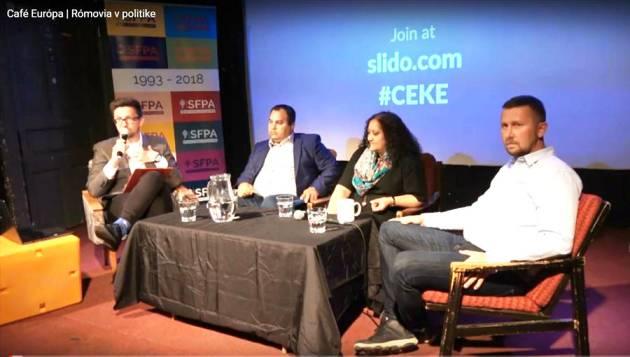Slovakia: Café Európa discusses underrepresentation of Romani people in politics

While Romani people comprise almost 10 % of the population of Slovakia, the proportion of Roma elected to office there is far less – the situation is changing at the local level, but Romani-profiled political parties have not yet broken through at the national level. This subject was recently reviewed during a discussion through Café Európa in Košice, a podcast that has been running under the auspices of the Representation of the European Commission in Slovakia since 2010.
VIDEO
Contradictory statistics
If we ask how many Roma there are in Slovakia, we learn that there are two very different sets of data on that subject: While 100 000 inhabitants of Slovakia declared their Romani nationality during the most recent census, the Government’s “Atlas of Romani Communities” reports four times that number. According to Tomáš Hrustič of the Institute of Ethnology and Social Anthropology at the Slovak Academy of Sciences, there is a rather simple explanation for what seems at first glance to be an incomprehensible difference.
During the last census it was possible to declare just one nationality, even though Romani people very often have more than one identification. Moreover, Romani people are reluctant to declare their ethnicity.
“Romani people are afraid to register with any nationality other than Slovak because they fear losing their citizenship, and state bureaucrats do not explain the difference between citizenship and ethnicity to them,” said Jarmila Vanová, a field social worker and politician. In academic circles, the end result is a consensus that there are approximately between 400 000 and 500 000 Romani people living in Slovakia.
It is also necessary to consider that in the south, the Hungarian and Romani minorities overlap. If all the Romani people in the country were to declare their Romani identity, some academics believe they could constitute the country’s biggest minority, even more numerous than ethnic Hungarians.
The difference between Hungarian and Romani politicians
The ethnic Hungarian minority has a stable representation in Parliament through a political party, and it is not unusual for that party to also be included in governing coalitions – ethnic Hungarians are also strongly represented politically at the level of local administrations. Currently Romani people in Slovakia are politically active more at the local level.
“A mayor knows how to provide direct aid, and Romani people perceive this. They want to elect their own mayors,” explained Marcel Šaňa, the Romani mayor of the Luník IX municipal department in Košice.
Šaňa has concluded, based on his own experience and that of others, that small-scale projects at the level of municipalities, initiated by mayors, are very often more targeted – and mainly, faster – than statewide strategies are. Mayor Vladimír Ledecký of Spišský Hrhov has also become famous for involving Romani residents in that town’s successful development.
Ledecký established a municipally-owned firm where most of the employees are Romani residents who coexist harmoniously with everybody else. Both mayors have also managed to raise money from EU funds for further local development.
Hrustič points out that the trend is positive. “Of the 35 mayors who are Romani, 29 were re-elected – and not just in communities where Romani inhabitants are in the majority,” he noted.
Hundreds of Romani people have been elected as local assembly members in Slovakia, which inspires others to actively get involved with politics at the local level, but overall just a fraction of Slovakia’s municipalities include Romani people in local government. Compared to the Hungarians, at the national level the Roma have only ever had one MP.
The previous MP from the Romani community was Peter Pollák, who became the first Slovak Member of the European Parliament of Romani nationality this year. Currently the Romani community is represented in the Slovak Parliament by Štefan Vavrek, a member of the Most-Híd party.
Vision for the future
Vanová sees the main barrier to the success of a single Romani-profiled party as consisting of the ethnic minority’s own diversity. “The Romani community is comprised of the Rumungri, who are the biggest group, the Olah (Vlax) Roma, and many other groups,” she noted.
Along with Mayor Šaňa, Vanová said she does not consider Róbert Botoš, the so-called Romani King, to be an actual representative of ethnic Roma in Slovakia. In the long term, both said they hope a Romani-profiled party will win seats in Parliament one day.
Currently they are calling on political parties to field Romani candidates in electable positions on their candidate lists – their appeal is clear and the next elections await Slovakia in less than six months. We will see whether a relevant political party responds to their appeal and what results Romani-profiled parties achieve in the next elections.
